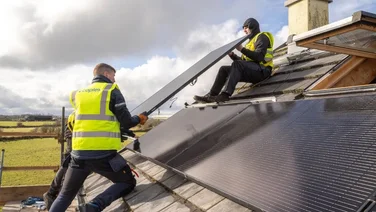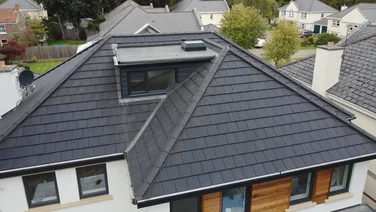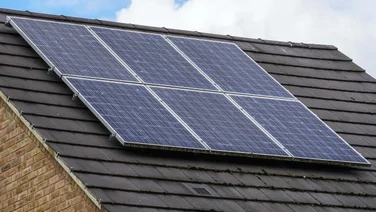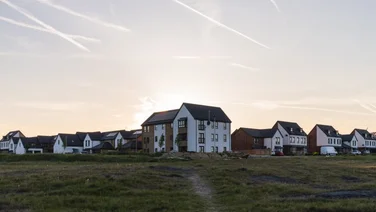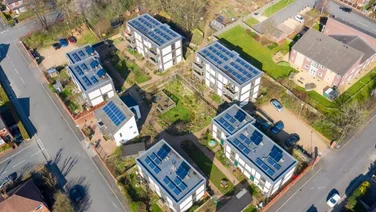- Is there a maximum number of solar panels you can have?
- Is there a maximum amount of solar energy you can produce?
- How many solar panels can the average roof hold?
- How many solar panels should you have?
- Are there any downsides to large solar panel systems?
- Summary
- The maximum number of solar panels allowed: FAQs
✔ There is no maximum number of solar panels you’re allowed to have in the UK
✔ Any solar installation above 3.68 kWp must have permission beforehand
✔ Buying an oversized solar panel system is less cost-effective
The cost of solar panels is tumbling while the price of electricity stays high, so it makes sense that you’d want to know the maximum number of solar panels you can have.
In this guide, we’ll explain the legal limits on how many panels you can get, the size of your solar panel system, and the drawbacks of buying a large solar array.
If you want to go solar at any point, you can compare solar panel prices with our help. Just provide a few quick details, and our expert installers will be in touch with free quotes for you to compare.
Where do you want to install solar panels?
Get started
Is there a maximum number of solar panels you can have?
There is no maximum number of solar panels you can have.
Of course, at some point you’ll run out of space – after all, there are only so many panels you can physically fit on your roof or land, even if you own dozens of acres.
But as long as they’re safely installed, properly connected to your electricity supply, fully situated on your property, and follow all relevant planning permission rules, there’s nothing stopping you from having as many solar panels as you want.
Is there a maximum amount of solar energy you can produce?
There isn’t a maximum amount of solar energy you can produce.
However, your solar panel installer must inform your Distribution Network Operator (DNO) – the company controlling the hardware that supplies your area with electricity – before installing a system with a peak power capacity above 3.68 kWp per phase.
That means if you have a single-phase setup, as the great majority of UK homes do, you’ll need prior approval for any installation above 3.68 kWp.
A household with three-phase electricity will be able to install 11.04 kWp – 3.68 kWp for each of its phases – without asking for permission in advance of the installation.
Upgrading your electricity supply from single-phase to three-phase typically costs between £8,500 and £10,000.
If your installer does have to ask for approval before the job, that’s no reason to worry. Solar panel systems under 5 kWp are usually approved without any issues.
Installations above 5 kW normally require extra checks, but still almost always get a stamp of approval, albeit after a slight delay.
How many solar panels can the average roof hold?
The average roof on a three-bedroom house in the UK can hold 20 solar panels.
This home will typically come with a roof space of 70 m², which is enough room to fit five rows of four solar panels.
Solar panels are usually about 2 m² – meaning you could technically fit more than 20 – but your installer is legally required to leave at least 20 cm between your panels and the edge of the roof, on every side.
They’ll also usually ensure there’s about 15 cm between each row of solar panels, to give the frames space to contract and expand as temperatures change throughout the year.
Thankfully, space is usually the only issue, as UK roofs can almost always hold the weight of a solar panel installation.
Our roofs can usually support at least 108 kg per square metre, which is 12.5 times as much as the average solar panel needs.
How many solar panels should you have?
The average three-bedroom household should have 10 solar panels.
We’re assuming this home consumes 2,700 kWh of electricity per year – the national average – and will use 50% of its solar energy, which again is typical.
The average one-bedroom house should get six solar panels, while a bigger household with four or five bedrooms will usually need 14 panels.
Check out our guide to see how many solar panels you need for your home.
Are there any downsides to large solar panel systems?
Aside from the upfront cost, there are no downsides to large solar panel systems – as long as it makes sense for your household.
If you use a lot of electricity – for instance, more than 4,000 kWh per year – you can save several hundred pounds on your energy bills per year with solar panels.
But if you buy a solar panel system that produces significantly more electricity than you can use, you won’t break even as quickly.
You’ll still make money from exporting your excess energy to the grid, through the Smart Export Guarantee, but you’ll almost certainly receive less than you pay the grid for electricity.
This all means that every extra solar panel you get above the optimal number for your home will add 0.4 years onto your break-even point, on average.
To work out what size solar panel system you need, just use our solar panel output calculator.
Summary
Now that you know the maximum number of solar panels you’re allowed in the UK and have all the associated information at your fingertips, the next step is to go solar.
We’d recommend getting as many solar panel quotes as you can, to ensure you get the best possible deal on your installation.
You can kick-start this process by using our free comparison tool. Simply fill in a few details and our trusted suppliers will get in touch with free quotes.
The maximum number of solar panels allowed: FAQs
Is there a limit on how many solar panels you can have?
There is no limit on how many solar panels you can have on your property.
As long as you don’t break any local planning rules, you can buy all the solar panels you want – just make sure they’ll fit on your roof and/or land first.
There’s also no limit on how much power you can generate – though if your system’s capacity is over 3.68 kWp, your installer will have to gain approval from your Distribution Network Operator (DNO) first, unless you have a three-phase electricity supply.
What happens if I have too many solar panels?
If you have more solar panels than you need, your system won’t be as cost-effective as it could be.
That means you’ll take longer to break even on your solar panels, and your overall return on investment will be worse.
Use our solar panel calculator to find out approximately how many panels you should buy for your home.
Do I need DNO approval for solar panels?
You only need to seek approval from your Distribution Network Operator (DNO) before your solar panel installation if its capacity will be over 3.68 kWp per phase.
Since most UK homes have single-phase electricity, this means anything over 3.68 kWp will require you to gain permission beforehand.
DNOs usually approve solar panel installations without too much trouble or delay, though.

